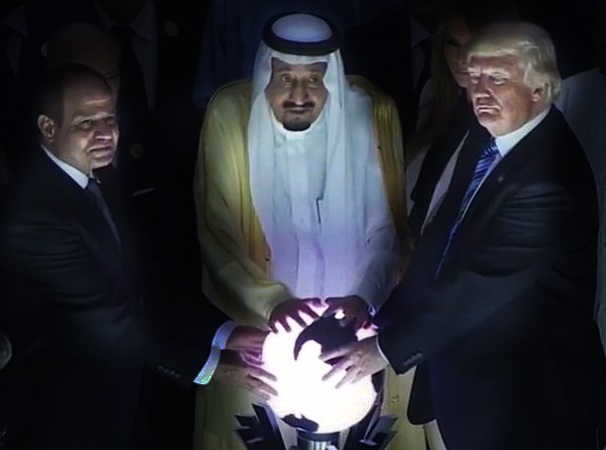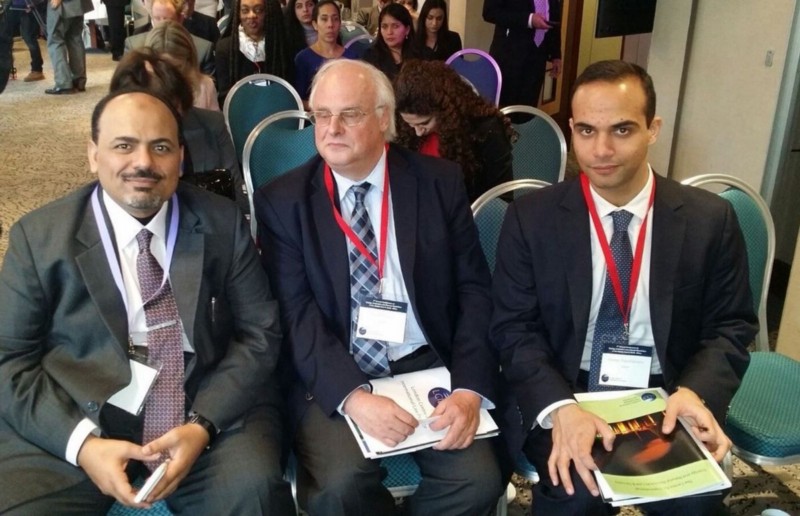Donald Trump and Joseph Mifsud, the mysterious "professor" in the Trump-Russia affair, have almost certainly never met but one day last year their paths crossed in the unlikeliest of places: Saudi Arabia.
On 21 May the American president was in Riyadh for a summit attended by leaders of more than 50 Arab and Muslim countries, and the centrepiece of the occasion was a half-hour speech by Trump in which he called for renewed efforts "to conquer extremism and vanquish the forces of terrorism".
Saudi Arabia, which had once been home to 15 out of 19 hijackers in the 9/11 attacks, was eager to display anti-terror credentials and besides giving his speech Trump attended the opening of the kingdom's Global Center for Combating Extremist Ideology. It was there, in one of the weirder moments of the presidential visit, that Trump, the Saudi King and the Egyptian dictator, Abdel Fattah el-Sisi, posed for photographs with their hands placed on an eerily glowing orb.

Meanwhile, over at the Intercontinental Hotel in the Saudi capital, a related event was taking place – the Riyadh Forum on Countering Extremism and Fighting Terrorism, where Joseph Mifsud chaired one of the panel discussions.
What few realised at the time was that by hosting this festival of anti-terrorism the Saudis were setting the scene for a drama that was to follow: an attempt to topple the emir of Qatar on the grounds that his country was supporting terrorism.
Three days later, someone hacked into the website of Qatar's government news agency and posted a fake news item reporting a fictitious speech supposedly made by the emir at a military ceremony. Insisting that the reported speech was genuine, Saudi and Emirati media then began an unprecedented tirade against Qatar and its emir. This paved the way measures by the Saudi, Emirati, Bahraini and Egyptian governments which, in effect, placed Qatar under an economic siege.
Mifsud vanishes
Why "professor" Mifsud had been invited to Riyadh is a bit of a mystery. He had no particular expertise in counter-terrorism but was an inveterate conference-goer whose travels had often taken him to Russia. He was also an avid networker who got himself photographed with the British foreign secretary, Boris Johnson, claimed links with the Elysée Palace in France and boasted of being "friends" with Sergei Lavrov, the Russian foreign minister.
Mifsud vanished last October – apparently going into hiding after he was identified as a central figure in the Trump-Russia affair. During Trump's election campaign, according to a document released by the US Justice Department, he was in contact with George Papadopoulos, one of Trump's foreign policy advisers, and offered to help set up a meeting between Trump and the Russian president, Vladimir Putin.
At the Saudi conference, held under the auspices of the Islamic Military Counter Terrorism Commission, Mifsud chaired a panel on "The Terror/Crime Nexus". The video above shows the discussion (it was discovered by Chris Blackburn who posted a link to it on Twitter).
The panel's four speakers were Michael Hurley, a former CIA officer; Katherine Bauer of the Washington Institute thinktank (and a former adviser on Iran for the US Treasury); Khalid Al Khalifa, a member of Bahrain's Shura Council, and Rajan Basra, a research fellow at King’s College London.
A note in the conference programme described Mifsud as director of the London Academy of Diplomacy (he wasn't – it had closed almost a year earlier) and a "full professor" at Stirling University in Scotland (his actual title was "professorial teaching fellow").
Interestingly, another speaker at the conference was Franco Frattini, a former foreign minister of Italy. Frattini and Mifsud were connected through the Link Campus university in Rome where they both held posts.
Mifsud's activities during the Trump election campaign raise the question of whether he was some kind of Russian agent. If so, the organisers of the Riyadh conference can be added to the growing list of those who were taken in by him.
Whether his Saudi connection has any significance remains to be seen, but the trip to Riyadh was not his only inolvement with Saudis.
Among his many roles, Mifsud was a director at the London Centre of International Law and Practice (LCILP) which has a cooperation agreement with a Saudi law firm and the Saudi Law Training Centre (STLC), founded by Majed Garoub, who also runs the law firm. Garoub is a prominent Saudi lawyer who sits on the legal committee of the world football body, Fifa.
LCILP, SLTC and Garoub organise an annual Middle East Law Conference in Morocco. At the 2016 conference Mifsud spoke on "Execution of Judicial and Arbitral Awards in the Middle East".
In March 2016 SLTC and Garoub's law firm were also partners with LCILP for a conference on “Energy Arbitration and Dispute Resolution in the Middle East and Africa” held in London. George Papadopoulos – the first person to be indicted in the Trump-Russia investigation – was working for LCILP at the time and attended the conference.
The photo below, taken at the conference, shows Papadopoulos (on the right) with Garoub (on the left).


 RSS Feed
RSS Feed
